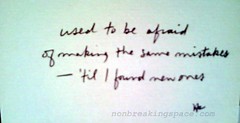Luck runs out.
In 2007, when I was struggling not just to enjoy but to hold on to life, I inherited what turned out to be a lucky portable oxygen concentrator from my good friend Emily, who had inherited it in turn from another friend.
Shortly after she received her ((the concentrator had been named Claire)), Emily got her transplant ((double lungs, same as me)) and passed her on to me.
Six months after I adopted Claire, I was blessed with my second chance at life.
In deference to the lives she had touched and the continuing legacy of the lucky little concentrator, I in turn passed her on to my friend Sam.
The thing about luck is, it runs out. As I was celebrating my 26th birthday – a birthday very few, if any, of my family believed I would reach – Sam was slipping away and died shortly afterwards.
We can not – and should not – need to rely on luck to ensure people receive the transplants that will save and transform their lives. Luck should never come into it.
Please sign the organ donor register.










